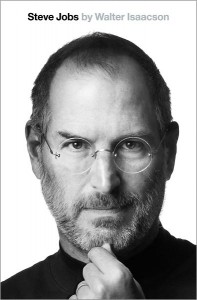The new Steve Jobs biography is an incredible read so far. Perhaps it’s because most of this is new to me (I’ve never been much of an Apple fan or followed the Steve Jobs story) or perhaps it’s because Walter Isaacson is an extremely engaging writer. Regardless of why, I’m greatly enjoying the read about the fascinating depth of the polarizing Steve Jobs, the birth of Silicon Valley, and the rise of Apple.
In the opening chapter, entitled Childhood, there are a number of passages and quotes that stood out to me as being oh-so-true in regards to education. Here are a few of them:
On school and curiosity:
Even before Jobs started elementary school, his mother had taught him how to read. This however, led to some problems once he got to school. “I was kind of bored for the first few years, so I occupied myself by getting into trouble.” It also soon became clear that Jobs, by both nature and nurture, was not disposed to accept authority. “I encountered authority of a different kind than I had ever encountered before, and I did not like it. And they really almost got me. They came close to really beating any curiosity out of me.”
His parents’ view of the situation:
“Look, it’s not his fault,” Paul Jobs told the teachers, his son recalled. “If you can’t keep him interested, it’s your fault.”
Both of his parents, he added, “knew the school was at fault for trying to make me memorize stupid stuff rather than stimulating me.”
On his fourth grade teacher:
“I learned more from her than any other teacher, and if it hadn’t been for her I’m sure I would have gone to jail.”
After starting middle school at Crittenden Middle, located in a neighborhood filled with ethnic gangs, Jobs pleaded with his parents:
“I insisted they put me in a different school. When they resisted, I told them I would just quit going to school if I had to go back to Crittenden. So they researched where the best schools were and scraped together every dime and bought a house for $21,000 in a nicer district.”
On the counterculture of the late 1960s:
It was a time when the geek and hippie worlds were beginning to show some overlap. “My friends were the really smart kids,” [Jobs] said. “I was interested in math and science and electronics. They were too and also into LSD and the whole counterculture trip.”
Steve Jobs didn’t fit in to the traditional classroom, and it took one very good fourth grade teacher to keep him motivated and engaged. I wonder how many future “geniuses” (and I use the term cautiously) have had their curiosity beaten out of them and their motivation stifled at a young age? Did they go on to do great things anyway?
I highly recommend picking this book up. It’s only $25 at Chapters – not bad for a brand new hardcover book that clocks in at nearly 600 pages.